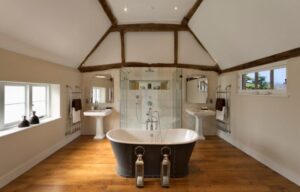Title: How To Add Value With A Secondary Suite Renovation
Hey there, future real estate mogul. So, you’re staring at that unused basement, that empty garage, or that dusty attic and thinking, “There has to be a better use for this space than storing holiday decorations and questionable DIY projects from a decade ago.” We get it. We’ve been there.
What if we told you that space is a goldmine? A secondary suite isn’t just an extra room; it’s a strategic move. It’s about generating rental income, boosting your property’s value, and creating a versatile living space for family, guests, or your future self. But let’s be honest, the world of home remodeling can feel like a maze of permits, Pinterest fails, and contractor horror stories. Don’t worry, we’re going to walk through this together.
Why Bother? The Glorious Perks of a Secondary Suite
Before we start knocking down walls, let’s talk about the “why.” Because let’s face it, any home renovation is a commitment. We’re not just talking about a little extra cash here (though that’s a pretty sweet perk).
- A Steady Stream of Income: This is the big one. A legal secondary suite provides a reliable monthly rental income that can help you pay down your mortgage faster or fund that dream vacation. It’s like your house gets a job.
- Skyrocket Your Property Value: When appraised, a legal, permitted suite adds significant square footage and functionality to your home. This isn’t just a finished basement; it’s an income-generating asset. Potential buyers see that, and they’re willing to pay for it.
- Multigenerational Living Made Easy: Got teenagers craving independence? Aging parents you want close by? A secondary suite offers privacy for everyone while keeping family connected. It’s the perfect balance.
- Maximizing Your Investment: You already own the land and the structure. You’re just unlocking the potential that’s already there. It’s the smartest kind of home addition you can do.
First Things First: The Not-So-Glamorous (But Vital) Planning Stage
We know, we know. You want to see sledgehammers and design samples. But trust us, skipping this step is how good dreams go bad. This is where you need to put on your project manager hat.
Understanding Zoning and Permits
Every municipality has its own rules. What works in one county might be a no-go in another. You need to answer questions like: Is a secondary suite even allowed on my property? What are the parking requirements? What are the specific safety codes?
Trying to navigate this alone can make your head spin. This is one of the first places a local expert shines. For instance, when we at Verified Builders take on a project here in Denver, we handle all the permit applications and zoning verification for you. It saves you a massive headache and ensures everything is above board from day one. Because an unpermitted suite? That’s a liability, not an asset.
Budgeting Like a Pro
Let’s talk numbers without flinching. A secondary suite renovation isn’t cheap, but it’s an investment. Your budget needs to account for more than just drywall and paint.
We typically break it down into three categories:
- Soft Costs: Permits, design fees, and potential engineering reports.
- Construction Costs: Materials, labor, and all the physical work.
- Contingency Fund: Always, always set aside 10-15% for the unexpected. Found black mold behind the shower wall? Contingency fund. Need to upgrade an electrical panel you didn’t know was outdated? Contingency fund. This fund is your peace of mind.
Choosing Your Suite’s Vibe: Basement, Garage, or Bump-Out?
So, where is this money-making marvel going to live? Each option has its own personality and price tag.
The Basement Renovation: The Classic Choice
Ah, the basement. It’s often the biggest and most logical space for a suite. The upside? The structure already exists. The downside? You’re often working with low ceilings, lack of natural light, and moisture concerns.
A successful basement renovation needs a great basement remodel contractor. It’s not just about throwing up some walls; it’s about making a subterranean space feel warm, bright, and, most importantly, dry. We specialize in basement renovations that nobody would ever guess are underground, using clever lighting, waterproofing, and layout design.
The Garage Conversion: The Efficient Option
Got a garage that’s more of a storage unit than a car park? Converting it can be a fantastic and often quicker path to a suite. Since it’s already on a slab and typically has decent headroom, the shell is there.
The main challenge here is insulation. Garages are notoriously drafty. A proper garage conversion requires fully insulating walls and the floor, running new HVAC ducts, and making it as comfortable as the main house. It’s a killer way to add a modern, street-level suite.
The Bump-Out or Above-Garage Suite: The High-End Play
This is for when you’re thinking bigger. Maybe you don’t have the basement space, or you want a truly separate, premium unit. Building an addition above the garage or extending the home’s footprint falls into the realm of luxury home renovations.
It’s a bigger project, often akin to whole house remodeling in its complexity, but the payoff can be a stunning, purpose-built suite that commands top-tier rental rates. This is where a home addition contractor with serious experience is non-negotiable.
The Dream Team: Why Your Contractor Choice is Everything
You wouldn’t let just anyone perform surgery on you, right? (We hope not). Your choice of a general contractor is just as critical. A quick search for “home renovation contractor near me” will give you a million options, but how do you find the right one?
Look Beyond the “Nearest” or “Closest”
The nearest contractor might be convenient, but are they the best for the job? Don’t just pick the closest name on the map. You need a specialist. Look for house remodelers with specific, proven experience in creating secondary suites. Do they have a portfolio full of bathroom remodeling and kitchenette installs? That’s a good sign.
The Power of Reviews and Word-of-Mouth
In our world, reviews are everything. They’re the digital word-of-mouth. Take the time to read them. Look for patterns. Are clients consistently praising their communication, problem-solving, and cleanliness? Or are there red flags about budgets blowing up? When you’re looking for a remodeling company, this research is your best weapon.
Here at Verified Builders, our reputation is built on this. We’re not just another general contractor; we’re your partners in this process. We encourage you to dig into our reviews and see what Denver homeowners are saying about their experience with us. It’s the truest measure of what you can expect.
Designing for Profit and Livability
Now for the fun part. Designing a suite is different from designing your primary home. You’re designing for function, durability, and broad appeal.
The Kitchenette: Small but Mighty
You don’t need a gourmet kitchen, but a functional kitchenette is a must. Think:
- A small fridge, a microwave, and a two-burner cooktop.
- Durable, easy-clean countertops like quartz.
- Ample cabinet storage.
This setup covers 99% of a tenant’s needs without eating up your budget or square footage.
The Bathroom: Non-Negotiable
Every suite needs its own full bathroom. This is a prime area to hire a specialized bathroom renovation contractor. They understand the intricacies of plumbing, waterproofing, and space-saving design. A well-executed bathroom feels spacious and luxurious, even in a small footprint.
The Living/Sleeping Area: The Art of the Open Plan
An open-plan layout makes a small space feel larger. Use a studio-style setup or creative room dividers to define the sleeping and living areas without closing them off with walls. Focus on bringing in as much natural light as possible and using a light, neutral color palette to make the space feel airy and bright.
Budget & ROI Breakdown: A Realistic Look
Let’s get concrete. Here’s a simplified table to give you a ballpark idea of costs and potential returns for different suite types in our market. Remember, these are estimates and can vary widely based on finishes, size, and site conditions.
| Suite Type | Average Project Cost Range | Key Cost Factors | Potential Monthly Rental Income (Denver Area) | Estimated Value Add to Home |
|---|---|---|---|---|
| Basement Suite | $75,000 – $150,000 | Waterproofing, Egress Window, Ceiling Height | $1,200 – $2,200 | 70-80% of project cost |
| Garage Conversion | $60,000 – $120,000 | Insulation, HVAC Extension, Flooring | $1,400 – $2,000 | 60-75% of project cost |
| Bump-Out/Addition | $150,000 – $300,000+ | Foundation Work, New Roof, Full Utilities | $2,000 – $3,000+ | 50-70% of project cost |
Reading the Table: The “Value Add to Home” is a key metric. It means if you spend $100,000 on a basement renovation, you could increase your home’s value by roughly $70,000-$80,000 immediately, plus you get the monthly rental income. That’s how you win.
Three Questions We Hear All the Time
1. “Will the renovation noise and mess take over my life?”
It’s a valid fear! A good remodeling company will have a strict process to minimize the impact on your daily life. We set up dust barriers, maintain a clean worksite, and stick to agreed-upon working hours. It’s not a silent process, but it shouldn’t be a nightmare either. Clear communication from your general contractor about the schedule is key.
2. “How long does a project like this actually take?”
From initial design to handing over the keys, a standard basement remodel or garage conversion can take anywhere from 3 to 5 months. More complex custom remodels or additions can take 6 months or longer. A big part of the timeline is the permit approval process with the city, which is why having a team that knows how to navigate it is crucial.
3. “Is it really worth the investment?”
Honestly? If done correctly, absolutely. You’re creating a tangible asset. The combination of immediate equity growth and long-term passive income is a powerful financial one-two punch. It’s one of the smartest home remodeling investments you can make. IMO, it beats the stock market for a good, tangible return you can actually live with (or rent out).
Your Next Step Towards a Smarter Home
So, there you have it. Adding a secondary suite is more than a home renovation; it’s a lifestyle and financial upgrade. It takes planning, a stellar team, and a clear vision, but the payoff is absolutely worth the effort.
You don’t have to figure it all out on your own. If you’re in Denver and this is sounding more and more like the right move for you, give us a call at Verified Builders. Let’s have a real conversation about your space, your goals, and your budget. We can help you turn that underutilized area into the most valuable part of your home.
Why just have a house when you can have an investment property that you get to live in, too? Let’s build your equity, together.


